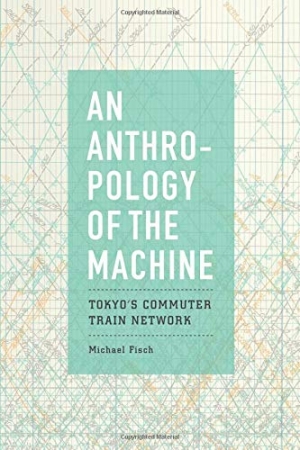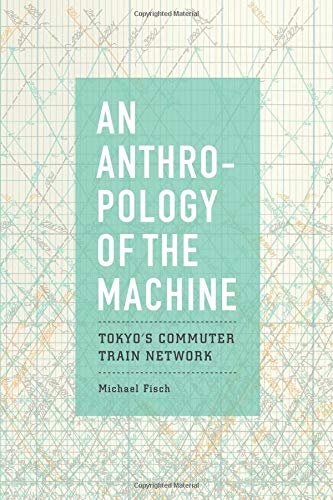The Department of Anthropology presents: Dr. Michael Fisch, Department of Anthropology, University of Chicago
"Mediating the Gap: An Anthropological Exploration of the Internet and Tokyo’s Commuter Train Network"
Wednesday, April 24, 2019
6:15 – 7:45 p.m.
Belk Library, Room 114
This event is free and open to the public.
Since the late 1990's in Tokyo, the commuter train network and the Internet have become increasingly integrated and symbiotic technologies. Where the former attends to the conveyance of bodies to and from work and leisure, the latter streams content and communications in ways that burst open the compressed confines of the daily commute. What was once an interval of packed transit disconnection has thus been transformed into a space and time open to hyper-connectivity. This talk will explore three different instantiations in which the Tokyo commuter train network is remediated through the web. In so doing, he argues that while web connectivity promises to transform the commuter experience, it opens the possibility for the train to serve as a point of critical intervention and transformation that begins with the question: Can the train teach us to care?
Michael Fisch’s research is situated at the intersection of sociocultural anthropology, science and technology studies and is concerned with the dynamic between changing conceptualizations of nature, culture and technological innovation that inform experiences of immersive technological mediation. In his work, "Anthropology of the Machine: Tokyo’s Commuter Train Network," he develops an ethnographically performative approach for thinking with the historically inflected practices, experiences and schemas of operation that emerge within Tokyo’s commuter train network. He is currently developing a project that explores the emergence of what he identifies as “experimental ecologies” that work to contest, recast,and re-conceive disaster infrastructure design in post-3.11 Japan. As part of this project, he is looking at locally developed alternatives to the construction of mammoth seawalls to protect against tsunami in northeast Japan.
Link to Bio: https://anthropology.uchicago.edu/people/faculty/michael-fisch
Link to Website: http://www.machinicnatures.net
This event is sponsored by the Departments of Anthropology; Cultural, Gender and Global Studies; Sustainable Development; Geography and Planning and Sociology as well as the College of Arts and Sciences and the Honors College. For more information, please contact Dr. Christina Verano Sornito at sornitocv@appstate.edu.
###
About the Department of Anthropology
The Department of Anthropology offers a comparative and holistic approach to the study of the human experience. The anthropological perspective provides a broad understanding of the origins as well as the meaning of physical and cultural diversity in the world — past, present and future. Learn more at https://anthro.appstate.edu.
About the Department of Cultural, Gender and Global Studies
The Department of Cultural, Gender and Global Studies offers degrees in global studies, interdisciplinary studies, and gender, women’s and sexuality studies. The department is also home to Watauga Residential College, an interdisciplinary, alternative general education program. The department promotes creative and imaginative engagement in cross-disciplinary investigation of complex systems and problems. Learn more at https://cgg.appstate.edu.
About the Goodnight Family Department of Sustainable Development
One of seven departments housed in the College of Fine and Applied Arts, the Goodnight Family Department of Sustainable Development at Appalachian State University prepares students to thoughtfully analyze human development while focusing on the applied practice of pursuing transformative, community-driven development and social change. It offers a Bachelor of Science degree in sustainable development with concentrations in agroecology and sustainable agriculture; community, regional and global development; and environmental studies; as well as a Bachelor of Arts and minor in sustainable development. Learn more at https://sd.appstate.edu.
About the Department of Geography and Planning
The Department of Geography and Planning promotes the understanding of the spatial dimensions of human behavior within the physical and cultural systems of the earth, and the role of planning in achieving improvement in those systems. The department offers degrees in geography and in community and regional planning. Learn more at https://geo.appstate.edu.
About the Department of Sociology
The Department of Sociology offers a Bachelor of Arts and six Bachelor of Science concentrations (applied research methods; criminology; deviance and law; families and intimate relationships; gerontology; social inequalities; and individually designed, which requires departmental approval). The department also offers minors in sociology and gerontology, plus two online graduate certificates in gerontology and sociology. Learn more at https://soc.appstate.edu.
About the Honors College
More than 500 students are enrolled in Appalachian State University's Honors College, which serves a diverse group of high-achieving, high-potential, highly motivated students from all majors. The Honors College helps students develop independent and creative thinking and high-level research skills; promotes interdisciplinary inquiry; and nurtures cultured and caring exchanges of ideas. The college’s enhanced academic experience prepares students for success in graduate or professional school and for leadership roles in their lives, communities and careers.

